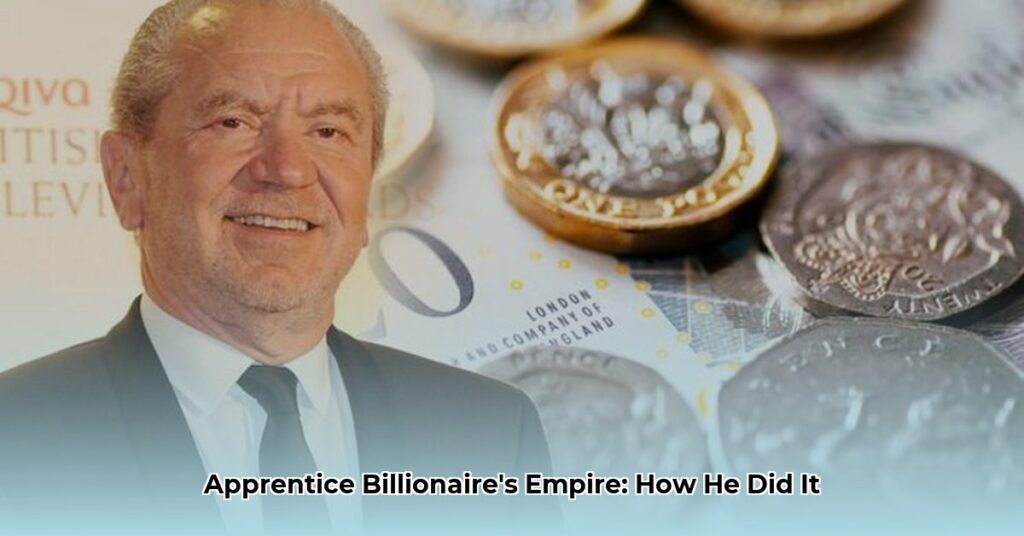Lord Alan Sugar. The name resonates with entrepreneurial grit, sharp business acumen, and the now-iconic phrase, “You’re fired!” But beyond the television persona lies a fascinating story of wealth creation. This article delves into Alan Sugar’s net worth, exploring his journey from humble beginnings to becoming a British business magnate.
From Hackney to High Finance: The Amstrad Genesis
Alan Sugar’s story isn’t one of inherited privilege. Born in Hackney, East London, his entrepreneurial journey began modestly, selling car aerials from a van purchased for a mere £100. This early hustle likely ignited a spark, laying the foundation for his future empire. In 1968, he founded Amstrad (Alan Michael Sugar Trading), a company that would become synonymous with affordable home computers and audio equipment in the 1980s. Amstrad’s success cemented Sugar’s status as a household name and significantly contributed to his burgeoning wealth. The eventual sale of Amstrad to BSkyB in 2007 for a reported £125 million provided a considerable boost to his already substantial fortune.
Beyond Amstrad: The Diversification Strategy
However, Sugar’s financial success isn’t solely tied to Amstrad. His portfolio extends across diverse sectors, revealing a strategic approach to wealth management. Amsprop, his privately held real estate company, is probably a significant contributor to his net worth, holding a substantial portfolio of commercial properties in prime London locations. Other ventures include Amsair, a private jet charter company, and various technology investments. His time as chairman of Tottenham Hotspur Football Club, while not always financially rewarding, likely contributed to his business network and overall profile.
The Apprentice Effect: Amplifying the Brand
While difficult to quantify precisely, The Apprentice has undoubtedly played a role in enhancing Sugar’s public image and reinforcing his brand as a shrewd businessman. This heightened visibility likely translates to increased business opportunities and strengthens his overall financial standing. The show provides a unique platform, showcasing his business acumen to a wide audience and further solidifying his position as a prominent figure in British business.
Deciphering the Billions: Estimating Sugar’s Wealth
Estimating net worth involves a degree of educated guesswork, particularly when it comes to privately held assets. Various sources, including the Sunday Times Rich List, place Alan Sugar’s net worth between £1.2 billion and £1.28 billion. However, it’s crucial to remember that these figures are subject to market fluctuations and the performance of his investments. For context, his reported tax payment of £186 million in 2021 underscores the immense scale of his financial success.
Charting the Sugar Empire: Key Milestones
| Year | Milestone | Impact on Net Worth |
|---|---|---|
| 1968 | Founding of Amstrad | Foundation of his business empire |
| 1980s | Amstrad’s dominance in home computing market | Substantial wealth accumulation |
| 2007 | Sale of Amstrad to BSkyB | Significant financial boost |
| 2015 | Officially becomes a billionaire | Major financial landmark |
| 2021 | Estimated net worth reaches £1.21 billion (reported) | Reinforces his status as a top UK billionaire |
| 2024 | Estimated net worth between £1.2 billion and £1.28 billion (estimated) | Continued wealth growth and diversification |
Delving Deeper: From East End to Empire
To fully understand Sugar’s success, we need to examine his early life and entrepreneurial beginnings. Growing up in post-war Hackney instilled a strong work ethic and resourcefulness. After leaving school at 16, he gained experience in various jobs, including a stint in the Civil Service. However, a traditional career path wasn’t for him. The £100 investment in his van to sell electronics was a pivotal moment. This direct-to-consumer approach not only generated income but also provided invaluable market insights.
The Amstrad Story: Disrupting the Tech Landscape
Amstrad’s success wasn’t just about selling products; it was about market disruption. Recognizing the high cost of early personal computers, Sugar offered the Amstrad CPC, a more affordable alternative that brought home computing to a wider audience. This strategic move propelled Amstrad’s growth and solidified Sugar’s reputation as a tech innovator. The 2007 sale to BSkyB wasn’t a sign of defeat, but rather a strategic divestment, providing capital for future ventures.
Beyond Electronics: A Diversified Portfolio
Sugar’s wealth isn’t confined to electronics. Amsprop, his real estate venture, is a significant asset. While exact figures remain private, industry experts suggest it could be worth anywhere from £450 million to £800 million. His aviation company, Amsair, caters to a high-net-worth clientele, further diversifying his income streams. The Apprentice, while contributing directly to his wealth (reportedly around £500,000 per season), also serves as a powerful branding tool, keeping him in the public eye and potentially opening doors to new opportunities.
The Future of the Sugar Empire
Predicting the future of any business empire is challenging. Market forces, technological advancements, and global economic trends all play a role. While we can analyze past performance and current holdings, the future of Sugar’s wealth remains subject to these unpredictable factors. However, his track record suggests a capacity for adaptation and innovation, making it likely that he will continue to navigate the business landscape effectively.
The Sugar Legacy: More Than Just the Bottom Line
Alan Sugar’s story is a testament to the power of entrepreneurial vision. From humble beginnings to billionaire status, his journey provides valuable lessons for aspiring business leaders. His emphasis on hard work, market awareness, and strategic diversification offers a compelling model for success in the ever-evolving world of business.



